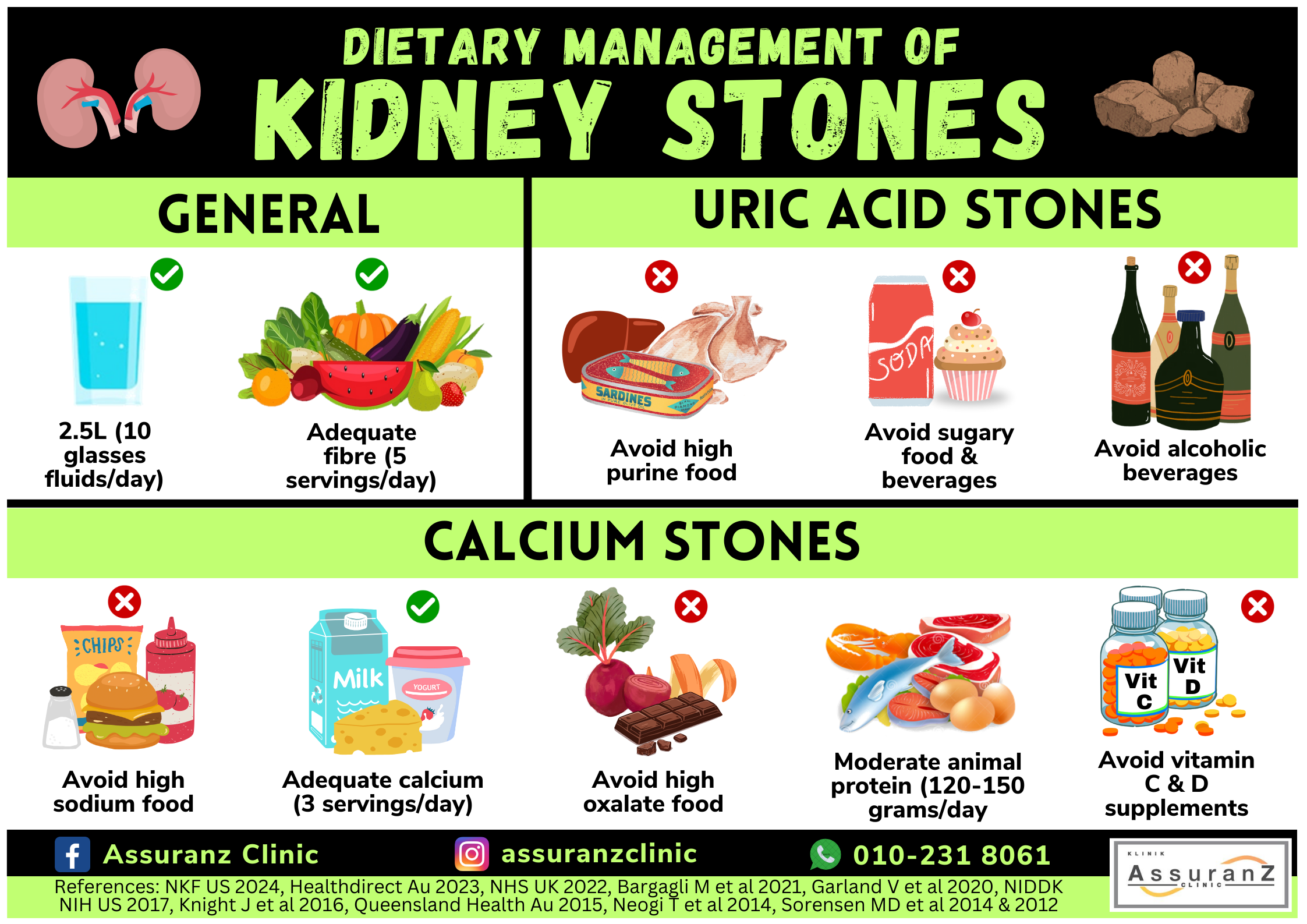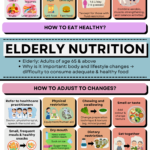The kidney is an organ that functions as a waste filter in the body. When there is too much waste filtered into the kidneys and not enough liquid to dissolve it, crystals that are commonly known as kidney stones can form. Kidney stones, or renal calculi, are hard solid deposits formed out of minerals and salts in the kidney. Kidney stone can be as small as a grain of salt, but the size can gradually increase if it is not removed.
肾脏是我们体内充当废物过滤器的器官。当过滤到肾脏的废物过多而没有足够的液体溶解它们时,就会形成晶体。我们称之为肾结石。肾结石是由肾脏中的矿物质和盐形成的坚硬固体沉积物。肾结石可以像一粒盐一样小,但是如果不清除,它的尺寸会逐渐增大。
There are four main types of kidney stones. The most typical form is calcium stones, which are made from either the combination of calcium with oxalate (more common) or with phosphate. Another common type is uric acid stones, formed when there is high uric acid waste. The more atypical types are struvite stones which are caused by infections of the urinary tract, and cystine stones which are formed as a result of a hereditary disorder called cystinuria.
肾结石有四种主要类型。最典型的形式是由钙与草酸盐(更常见)或磷酸盐的组合而成的钙结石。另一种常见的类型是尿酸废物过高所形成的尿酸结石。非典型类型则是由尿道感染所引起的鸟粪石结石,以及由一种叫胱氨酸尿症的遗传性疾病所形成的胱氨酸结石。
Untreated kidney stones can lead to bloody urine, severe pain, urinary tract infection, and kidney disease. Medical treatments and dietary modification can be done to treat and prevent the recurrence of kidney stones, individualised based on the type of stone. The general dietary recommendation to reduce the chances of kidney stones formation are as follows:
未经治疗的肾结石会导致血尿、剧烈疼痛、尿道感染和肾脏疾病。药物治疗和饮食调整可以治疗及预防肾结石复发,并根据结石类型进行个体化的治疗。减少肾结石形成的一般饮食建议如下:
1. Drink more fluid / 多喝液体
Drink at least around 2.5 litres or 10 cups of fluid daily, including other fluids such as milk and lemonade. With the exception of grapefruit juice, sweetened beverages, and alcohol, adequate fluid helps to produce less concentrated urine and ensure good urine volume, decreasing the risk of stone formation.
每天至少喝2.5升或10杯左右的液体,包括牛奶和柠檬水等其他液体。除了葡萄柚汁、加糖饮料和酒精外,充足的液体有助于减少尿液浓缩并确保良好的尿量,从而降低结石形成的风险。
2. High fibre intake / 高纤维摄入量
High dietary fibre intake can reduce the formation of oxalate and calcium absorption, hence, can reduce the risk of stones formation. Research has also shown that greater dietary fibre intake is protective against kidney stones formation. Therefore, one should consume 5 servings of fruits and vegetables, and opt for whole grain products to ensure adequate fibre intake.
高膳食纤维摄入量可以减少草酸的形成和钙的吸收,从而降低结石形成的风险。研究还显示,摄入更多的膳食纤维可以预防肾结石的形成。因此,应食用5份水果和蔬菜,并选择全麦产品,以确保摄入足够的纤维。
Precisely for calcium oxalate stone, the recommendations are as follows:
针对草酸钙结石的建议如下:
1. Low sodium intake / 低钠摄入量
High sodium intake can increase urinary calcium excretion, causing kidney stones. Thus, consumption of food high in sodium such as salt, sauces, seasonings, fast food, junk food, sodium bicarbonate, processed meat, canned food, pickles, and salted food (anchovies, dried shrimp et cetera) should be reduced.
高钠摄入会增加尿钙排泄,引起肾结石。因此,应减少摄入高纳食物,如盐、酱料、调味料、快餐、垃圾食品、碳酸氢钠、加工肉类、罐头食品、泡菜和腌制食品(凤尾鱼、虾米等)。
2. Low oxalate intake / 低草酸盐摄入量
High dietary oxalate intake can cause oxalate to combine with calcium in the kidney, forming calcium oxalate stone. Thus, high oxalate foods which include spinach, celery, cocoa products, beets, rhubarb, citrus peels, strong black tea, nuts, wheat germ, wheat bran, some berries, and star fruit should be limited.
饮食中草酸盐摄入量过高会导致草酸盐与肾脏中的钙结合,形成草酸钙结石。因此,应限制高草酸盐食物,包括菠菜、芹菜、可可制品、甜菜、大黄、柑橘皮、浓红茶、坚果、麦芽、麦麸、一些浆果和杨桃。
3. Adequate calcium intake (but not from supplement) / 充足的钙摄入量(不是通过补充剂)
Inadequate calcium leads to loss of minerals from the bone, which in turn can increase urinary calcium excretion and subsequently, the risk of oxalate stone formation. Consumption of calcium with meals can help reduce the absorption of oxalate. Therefore, one should consume three servings of calcium-rich food such as milk, cheese, and yoghurt with meals. Meanwhile, calcium supplements, especially if consumed separately from meals can increase calcium excretion without the beneficial effect on oxalate, thus increasing the risk of stones.
钙不足会导致骨骼矿物质流失,进而增加尿钙排泄,提高草酸盐结石形成的风险。随餐食用钙有助于减少草酸盐的吸收。因此,吃饭时应摄入三份富含钙的食物,如牛奶、奶酪和酸奶。于此同时,钙补充剂,尤其是与膳食分开服用会增加钙的排泄,但不会对草酸盐产生有益影响,从而增加患结石的风险。
4. Moderate protein intake / 适量蛋白质摄入量
High protein intake can lead to higher urinary calcium excretion, causing kidney stones. So, consumption of protein, especially of animal sources, should be in moderation. One should consume moderate serving which is around half palm-sized animal protein per meal (around 120 to 150 grams daily).
高蛋白质摄入会导致尿钙排泄量增加,引起肾结石。因此,蛋白质的摄入,尤其是动物来源的蛋白质应该适量。每餐应摄入适量的动物蛋白,即大约半个手掌大小的动物蛋白(每天大约120至150克)。
5. Avoid vitamin C and D supplements / 避免补充维生素C和D
Oxalic acid is one of the major end products of vitamin C metabolism. Excessive consumption through supplementation may lead to high oxalic acid excretion in the urine, leading to stone formation. While there is currently no evidence that vitamin D supplement can directly cause kidney stones, some research suggests that Vitamin D supplementation might increase the risk of stone formation as it can elevate the level of urinary calcium. Thus, supplementation of vitamin C and D without health professionals’ recommendation (i.e in case of deficiency et cetera) is not advised.
草酸是维生素C代谢的主要终产物之一。过量补充维生素C可能会导致尿液中的草酸排泄过多,从而形成结石。虽然目前没有证据显示补充维生素D会直接导致肾结石,但是一些研究表明补充维生素D可能会增加结石形成的风险,因为它会提高尿钙水平。因此,不建议在未经健康专业人士建议的情况下(即缺乏维生素等的情况下)补充维生素C和D。
For uric acid stones, the followings are recommended:
对于尿酸结石,建议如下:
1. Low purine intake / 低嘌呤摄入量
Uric acid is the end product of purine metabolism. Excessive purine consumption can lead to high uric acid level, which then can cause stones formation. High purine food including organs, game meat, fish egg, sardine, anchovies, mackerel, tuna, some seafood, yeast, budu, belacan, cencalok, and meat extract should be avoided, while medium purine food such as meat, chicken, legumes, and other fish should be consumed in moderation. As for vegetable and fungi high purine sources such as broccoli, spinach, asparagus and cauliflower, research has shown that they do not cause an increase in uric acid level.
尿酸是嘌呤代谢的最终产物。过量摄入嘌呤会导致尿酸水平升高,从而形成结石。高嘌呤食物,包括内脏、野味、鱼蛋、沙丁鱼、凤尾鱼、鲭鱼、金枪鱼、某些海鲜、酵母、budu、峇拉煎、虾子酱和肉提取物;而中等嘌呤食物,如肉类、鸡肉、豆类和其他鱼类应适量地食用。至于高嘌呤来源的蔬菜和真菌,如西兰花、菠菜、芦笋和花椰菜,研究表明它们不会导致尿酸水平升高。
2. Avoid alcoholic beverages / 避免饮酒
Alcohol can increase uric acid production and reduce uric acid excretion by the kidneys. This leads to uric acid accumulation and can cause stones production. Some alcoholic beverages such as beer also contain high purine levels. Abstaining from alcohol of all types can reduce risk of stones production.
酒精会增加尿酸的产生并减少肾脏对尿酸的排泄。这会导致尿酸积聚并形成结石。一些酒精饮料,如啤酒,嘌呤含量也很高。戒除各种酒精可以降低结石形成的风险。
3. Avoid sweetened food and beverages / 避免食用加糖食品和饮料
Sweetened food and beverages typically contain fructose, which is broken down into purines and consequently, into uric acid in the body. This in turn can increase risk of uric acid stone formation. Thereby, sweetened food and beverages such as syrups, breakfast cereal bars, candies, carbonated drinks, 3 in 1 drinks, and so on should be avoided.
加糖食品和饮料通常含有果糖。果糖在体内会分解为嘌呤,然后再分解为尿酸。这反过来会增加尿酸结石形成的风险。因此,应避免食用甜味食物和饮料,例如糖浆、早餐谷物棒、汤锅、碳酸饮料、三合一饮料等。






